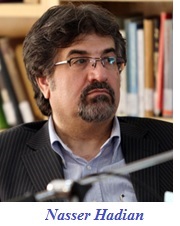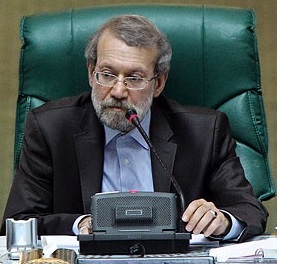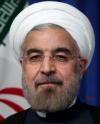Interview with Nasser Hadian
What role does Iran’s parliament (known as the Majles), play in Iran’s political system? To what extent is it constrained by the Council of Guardians?
 The Majles is a legislative branch of the Iranian government, made up of 290 members. Elections are held every four years, with the next one set to occur in February 2016.
The Majles is a legislative branch of the Iranian government, made up of 290 members. Elections are held every four years, with the next one set to occur in February 2016.The Council of Guardians, though categorized as part of the legislative branch, has more of a judicial function. The council is made up of 12 individuals. Six of them are directly appointed by the Supreme Leader, and six are proposed by the head of the judiciary and approved by the Majles.
The council’s main function is to determine whether a law passed by the Majles is opposed to the Iranian constitution or Sharia [Islamic law]. But it also plays a role in elections. Its role was supposed to be supervisory, but it has interpreted supervision to include disqualifying candidates in elections.
But the Majles still performs an important function, because the Council of Guardians does not have the authority to actually propose legislation. It can only review laws passed by the Majles. And unlike the U.S. Congress, the president does not have the power to veto Majles legislation.
Which major groups make up the current Majles?
The current Majles is dominated by a center-right coalition of three groups known as the Principlists, or politicians who support the early principles of the 1979 revolution. The two major groups are traditional conservatives and hardline radicals. The third group is a smaller category of conservative realists.
 Traditional conservatives are the largest group, accounting for around 120 seats. Speaker of Parliament Ali Larijani falls into this category, which has support among bazaar merchants and the clerical establishments of Tehran and Qom. Traditional conservatives are represented by Islamic Coalition Party, or Hezb-e Motalefeh-ye Eslami, and other parties. They are socially and fiscally conservative. They seek more privatization and less intervention from the state, as well as a smaller state bureaucracy.
Traditional conservatives are the largest group, accounting for around 120 seats. Speaker of Parliament Ali Larijani falls into this category, which has support among bazaar merchants and the clerical establishments of Tehran and Qom. Traditional conservatives are represented by Islamic Coalition Party, or Hezb-e Motalefeh-ye Eslami, and other parties. They are socially and fiscally conservative. They seek more privatization and less intervention from the state, as well as a smaller state bureaucracy.Hardline radicals hold about 75 seats in the Majles. Unlike traditional conservatives, they do not necessarily want a smaller state bureaucracy and are not all socially conservative. They are represented by the Solidarity Front, Jebhe Paydari. Additionally, conservative realists hold around 40 seats.
The Principlists generally do not share the same views as President Hassan Rouhani and the executive branch. But some traditional conservatives, especially Larijani, have supported Rouhani’s initiatives.
 On the other end of the political spectrum, there are two major groups of pro-modernization forces with around 40 seats in the Majles. One group is made up of reformists, including those aligned with former President Mohammad Khatami and the now-banned Islamic Iran Participation Front, or Jebhe-ye Mosharekat-e Iran-e Eslami. The second group includes supporters of President Rouhani and Expediency Council chairman Ayatollah Hashemi Rafsanjani, who was president in the 1990s. Their supporters are divided largely among two parties, the Moderation and Development Party, or Hezb-e Etedal va Toseh, and the Servant of Construction Party, or Hezb-e Kargozaran Sazandegi.
On the other end of the political spectrum, there are two major groups of pro-modernization forces with around 40 seats in the Majles. One group is made up of reformists, including those aligned with former President Mohammad Khatami and the now-banned Islamic Iran Participation Front, or Jebhe-ye Mosharekat-e Iran-e Eslami. The second group includes supporters of President Rouhani and Expediency Council chairman Ayatollah Hashemi Rafsanjani, who was president in the 1990s. Their supporters are divided largely among two parties, the Moderation and Development Party, or Hezb-e Etedal va Toseh, and the Servant of Construction Party, or Hezb-e Kargozaran Sazandegi.How might the election scheduled for February 2016 impact the political landscape? And what impact will the nuclear deal have on the outcome?
Pro-modernization forces are in a better position to recapture the Majles. In a fair competition, supporters of the sitting president have generally fared well in elections. So, in this election, the Principlists would be expected to lose seats, and maybe their majority.
In the past, however, the Council of Guardians has disqualified major candidates from reformists and pro-modernization parties. The council has already announced that it is not going to let so-called “seditionists” win back the Majles. “Seditionists” is a term used by hardliners to describe reform candidates, especially since the disputed 2009 presidential election. Even so, they cannot disqualify everyone. A number of lesser known candidates may be allowed to run; they may even be able to defeat some of the better-known Principlist candidates.
The majority of Iranians are likely to feel positively about the nuclear deal by the election, even though their lives are unlikely to improve much in material terms by then. The optimism may be enough to motivate many people to vote for pro-modernization parties. So, even if the Council of Guardians disqualifies the big names, people may still vote for relatively less well-known candidates that reflect their views.
How important is this election for the future of Iran?
Principlists currently control the judiciary, the Majles, the Assembly of Experts, the Revolutionary Guards and the Basij (paramilitary force). They have a lot of power, and they are willing to exercise it. The Majles election could be a major turning point.
 But a win by pro-modernization forces and reformists does not necessarily mean new political or social openings. Iran could actually face a backlash, with hardliners in various branches of government using their powers to contain change. For example, they might close more newspapers or detain more opponents. Ironically, however, if the Principlists win, they may feel more secure and thus be less inclined to use either judicial mechanisms or brute force against their opponents.
But a win by pro-modernization forces and reformists does not necessarily mean new political or social openings. Iran could actually face a backlash, with hardliners in various branches of government using their powers to contain change. For example, they might close more newspapers or detain more opponents. Ironically, however, if the Principlists win, they may feel more secure and thus be less inclined to use either judicial mechanisms or brute force against their opponents.If pro-modernization parties win, the most notable impact at home may be improvements in Iran’s economic situation and more efficient bureaucracy. With stronger support in parliament, Rouhani could also win a freer hand to pursue his foreign policy objectives, including other cooperation with the United States and regional governments – although with limits.
At the same election, votes will also select an Assembly of Experts. What is the Assembly of Experts, and why is it important?
The Assembly of Experts is an 86-member body composed of scholars of Islamic law. They are directly elected for eight-year terms from 30 different provinces. They do not have any legislative power. Their primary task is to oversee the supreme leader and determine whether he is performing his duties appropriately. The Assembly has the power and authority to remove the supreme leader.
After the supreme leader dies, the Assembly of Experts is responsible for appointing his successor. All of Iran’s political factions would like to have their own scholars in the Assembly of Experts so they can influence the choice of the next supreme leader—and field a candidate from among its members. (Supreme Leader Ali Khamenei is currently 76.) I anticipate that pro-modernization forces will not be allowed to field candidates. The competition will be mainly among Principlist factions. Traditional conservatives have a good chance of winning the largest share of seats.
The Assembly of Experts plays an important role, but it generally does not have a significant impact on day-to-day affairs and decision-making. They convene around twice a year to discuss major issues facing the country.
